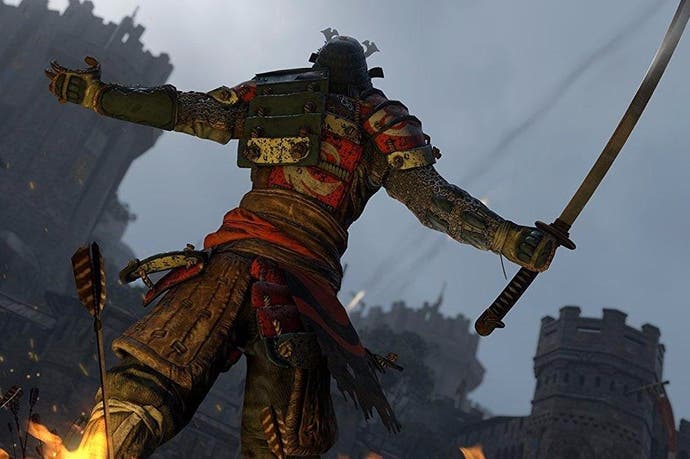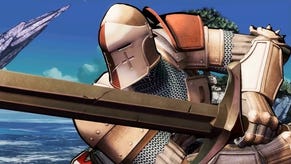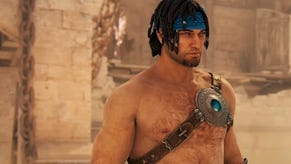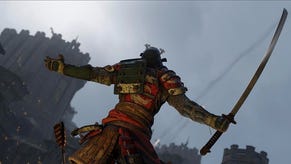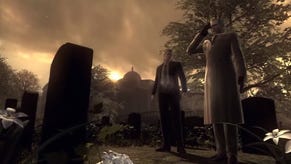For Honor is the best fighting game I've played in ages
To arms!
For Honor didn't interest me until a friend suggested I treat it like a fighting game. Now, with tens of hours of play behind me, I can't get For Honor's systems out of my head.
It was when I stopped thinking of For Honor as some generic MOBA-ish Dark Souls-esque melee combat game, and starting thinking of it as Soul Calibur in third-person that it sparked into life. As a fighting game fan, there really is a lot to love about Ubisoft's often frustrating, often thrilling hack 'em up.
For Honor is initially tricky. It's tempting to think you can pick one of the heroes, jump into an online match and button-mash your way to victory, but you'll just die, over and over again, as knowledgeable enemy players parry your clumsy slashes before countering with devastating attacks of their own. A bit like playing fighting games online, then.
For Honor can feel frustrating, too. The fighting feels slow and at times unresponsive. When I first started playing I thought my DualShock 4 controller had some kind of latency problem, so clunky were my attacks. But latency isn't providing the drag. I get the feeling For Honor is supposed to feel like this.
This is a game where Knights, Samurai and Vikings all fight each other with what is supposed to be relatively realistic weapon-based combat. It all rides on a stance and stamina system that favours considered strikes over relentless attacking. A small visual guide indicates which direction an enemy strike will come from: left, right or above. To block, you need to push the right thumbstick in the same direction. So far, so action game. But the trick is in the timing. You can't just leave your block to the last second. You have to push the direction knowing it'll take time for your warrior to switch weapon stance. So, duels are this tense back and forth between warriors who are constantly switching stances as they try to bait their opponent into a whiff.
As I said, For Honor can be tricky. Blocking isn't always easy, but it's a skill you can get better at - just like in fighting games. Constantly blocking and doing not much of anything else - aka turtling - won't get you very far. In fact it'll get you dead sooner rather than later because in For Honor, like in a lot of fighting games, you take chip damage. What you want to do is counter, and to do that, you need to parry.
Parrying involves pushing the right thumbstick in the correct direction, as if you were blocking, but adding a press of the heavy attack button. Nail the timing, and you'll stagger your opponent, putting them in a vulnerable state where you can land an attack for free.
That's For Honor, which is unlike most action games, and certainly unlike most Ubisoft games, but as someone who loves fighting games, it all feels familiar. And even at high level play, so much of the game seems best described using the parlance of the fighting game community. Pop online to see what For Honor players are talking about and you'll read talk of frame data, cancelling moves into other moves, unblockables and, my favourite, footsies. I've even come across a community-made spreadsheet that assesses all the moves in terms of their safety on block.

Take the Nobushi of the Samurai faction, for example. I've had a lot of fun annoying the hell out of my opponents by keeping my character at the kind of distance where I can punish a whiffed attack with a prod of my long-reaching Naginata. Every now and then I cancel an attack with the Hidden Stance move, which gives me a small number of invincible frames and sets me up for a combo mix-up. Prod, prod, prod, Hidden Stance, go in for a throw, back off, block, parry, thrust - this is Soul Calibur drenched in Ubisoft's trademark grim-dark clothing.
For Honor's guard break mechanic is interesting. It is, effectively, the same as a throw in a fighting game such as Street Fighter. In traditional fighting games, you want to knock your opponent down, preferably in the corner, as it gives you, the attacker, a huge advantage as you can mix-up your attacks as they "wake up" from the knocked down state. The knocked down player, on the other hand, needs to work out what they're going to do on wake-up. I love the mind games involved in all of this.
In For Honor, guard break shares similar properties. If you manage to grab your opponent, you can chuck them one way, to the floor or go for an attack with your weapon. The cool thing is, there is a rock, paper scissors element to the mechanic so that players have the chance to counter as they come out of their invincible state. You can counter the guard break, if you time it right, just as you can "tech" a throw attempt in Street Fighter. This resets both players, as it typically does in a fighting game. Or, if you guess the mix-up right, you can parry their strike, leaving you with an opportunity to do damage.
By the end of the open beta, I found myself thinking of the nine available heroes less like character classes and more like fighting game characters. Each uses a Revenge Mode meter, which rekindles memories of Street Fighter 4's Revenge Gauge. Each has a specific moveset and combos to learn. In For Honor, a shield user uses different blocking mechanics compared to a dual-wielder, for example. Your success rests as much on your ability with your character as it does with your knowledge of your opponent's.
Then there's the mind games. One of the reasons I love fighting games is because they're a platform for getting inside your opponent's head. When it works, you can "train" your opponent to do exactly what you want them to - and react accordingly. For Honor is no different. During the early moments of a duel, test the waters with a few attacks to let your opponent know what you're about. See how they respond. You know they're going to follow up that overhead heavy attack with a guard break attempt; tech the guard break, then chuck them onto some spikes you've positioned yourself near. Done and dusted.
For Honor's fighting game fundamentals appeal to me to such an extent that I ended up focusing on the modes that drilled down into the core combat. I can't find the fun in the chaotic Dominion mode, in which I'd often end up getting ganked by multiple players. Rather, I prefer the purity of 2v2 and even 1v1. Here, with the super power feats turned off, For Honor gets as close to a traditional fighting game as it can. It's just you, your fundamentals and your execution versus the same of your opponent. For Honor can be tense, it can be dramatic and at its best can live long in the memory.
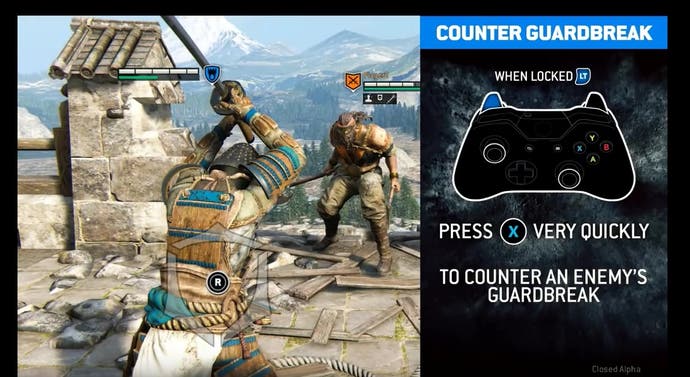
None of this is to say For Honor is without its problems. In fact it has a few quite significant issues. I've already mentioned the frame-rate on console. You can push the PC version to 60fps, of course, but we're looking at 30fps max on PS4 and Xbox One (I tested the PS4 version). For Honor would really benefit from being 60 frames per second - as traditional fighting games are. It's not that I'd like the game to feel faster. As I mentioned, the clunkiness of the combat feels intrinsic to For Honor's charm. But I would like it to feel more responsive. As you get stuck in to higher level strategies, when you're blocking attacks from multiple opponents, the frame-rate becomes more of an issue.
Like the best fighting games, For Honor players are already arguing vociferously about balance. I've read people complain about everything from the game's bleed effect to the way some of the characters' guard break works. Chucking people off cliffs is a frustration. It's early days at the moment, but I can say with some degree of certainty that the Warlord can do one. Nerf it, Ubisoft.
And there doesn't seem to be much to For Honor apart from the thrill of fighting. For me, that's fine. I can see myself climbing the ladder in 2v2 and 1v1 for months, but there will be a lot of people who want more from the game, and I'm not sure there's enough surrounding the core combat to satisfy that urge - single-player story mode or no.
The thing is, I can see For Honor rubbing a lot of people up the wrong way. I can see people jumping in, finding the fighting frustrating, then jumping straight out again, you know, like most fighting games. For Honor's tutorial does a pretty poor job of explaining its systems. What it should do is scream loud and clear: WATCH THE HERO VIDEOS. Really, watch them. Then play against the AI. A couple of hours in training makes For Honor a lot more fun.
For Honor, then, is the best secret fighting game around. It's a fighting game disguised as a medieval slash-them-up, but it's a fighting game nevertheless. Ubisoft won't want to market it that way, because fighting games are for nerds, right? They'll want to market it as this kick-ass greatest medieval warriors in history all get together to carve each other up in a fantasy video game deathmatch. The truth is, For Honor is Soul Calibur evolved, Street Fighter on a big old battlefield rather than an, err, street, and Mortal Kombat with knights in shining armour and vikings who chuck you off cliffs. And I'm loving it.
